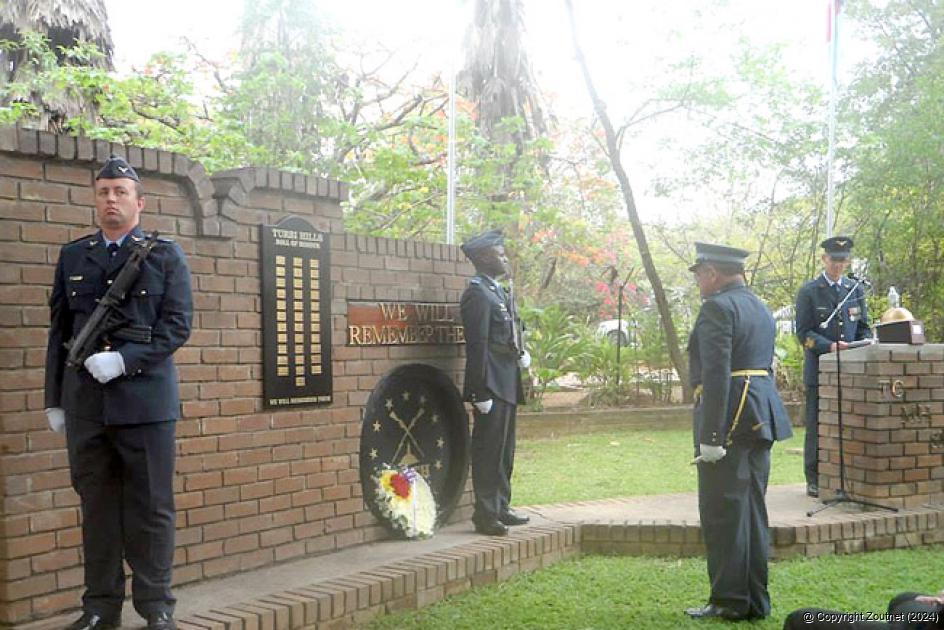
On Sunday, 8 November, several wreaths will once again be laid at the Turbi Hills Shellhole in Louis Trichardt as part of the annual Remembrance Day service, which marks the end of the First World War in November 1918.
News - Date: 15 October 2015
In Flanders fields the poppies blow
Between the crosses, row on row,
That mark our place; and in the sky
The larks, still bravely singing, fly
Scarce heard amid the guns below.
Few other poems have had such an influence on the way people perceive war as the one from Canadian military doctor and artillery commander Major John McRae. It is said that, on 3 May 1915, he scribbled down the famous poem in about twenty minutes while sitting on the back of a field ambulance. The previous day his good friend, Lt Alexis Helmer, was killed by a shell during the second battle of Ypres. McRae noticed the stark contrast of the poppies amidst the freshly dug graves while the sounds of warfare continued around them.
Major McRae also has an “African” connection. He served during the South-African Anglo Boer War as captain in the artillery and saw action at Balmoral and Lydenburg.
The reference to the poppies amidst the graves is not incidental. Throughout the world the poppy flower has become synonymous with Remembrance Day, often referred to as Poppy Day. This day was first celebrated to commemorate the end of the Great War (the First World War) which lasted from 1914 to 11 November 1918. During this brutal war, some nine million people lost their lives. The killing only stopped when a peace treaty was signed on the eleventh hour of the eleventh day of the eleventh month in 1918.
In South Africa, much like in other Commonwealth States, Remembrance Day is celebrated on the second Sunday in November. It normally goes hand in hand with church services and wreath-laying ceremonies. It has also become customary to wear a poppy pinned to the chest during such ceremonies.
The papaver rhoeas, as the fragile poppy flower is more formally known, has a history that stretches back more than 3 000 years. The flower was found in Egyptian pyramids and even Homer refers to it in the ancient Greek epic poem, Iliad. It has become the symbol of remembrance for fallen comrades and stories are even told of how the battlefields during the Napoleonic War were covered in red poppies. Genghis Khan’s battlefields were covered with the white Asian version of the poppy.
The mystery surrounding the poppy flowers may have a logical explanation. It is said that the poppy’s seed can lie dormant for a very long period. Once it is dug up and exposed to sunlight, the long-dormant seeds sprout and grow profusely.
For McRae the poppies were also in stark contrast of the dead soldiers. The poem continues to say:
We are the Dead. Short days ago
We lived, felt dawn, saw sunset glow,
Loved and were loved, and now we lie
In Flanders fields.
Not long after the end of the war, the British Legion was formed to assist soldiers who still battled with the injuries and losses suffered during the war. In 1921, a group of French war veterans' widows started making poppies out of cloth to raise funds to support the British veterans. The tradition of wearing a red poppy in remembrance thus gained momentum, to the point where it is now a common practice all over the world, and also in South Africa.
But in the end it is not about the poppies, but the fact that the deeds of those who died for what they believed in should be remembered. McRae’s poem finishes with this message:
Take up our quarrel with the foe:
To you from failing hands we throw
The torch; be yours to hold it high.
If ye break faith with us who die
We shall not sleep, though poppies grow
In Flanders fields.
In Louis Trichardt, the Remembrance Day service will take place at the MOTHs' Turbi Hills Shellhole at 66 Burger Street. The groups will get together at 10:30 for the service to start at 11:00.








